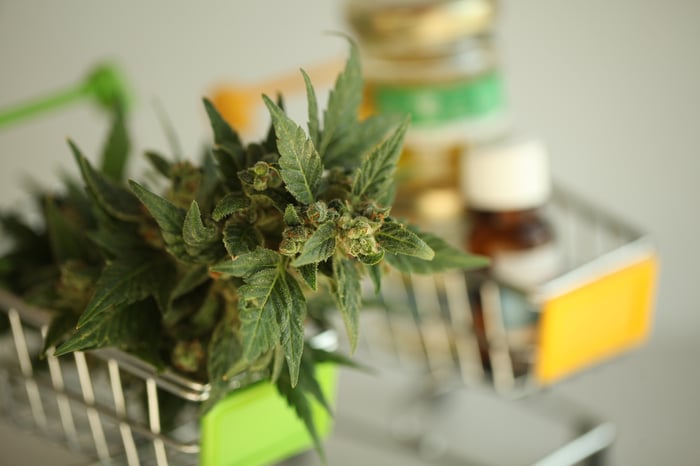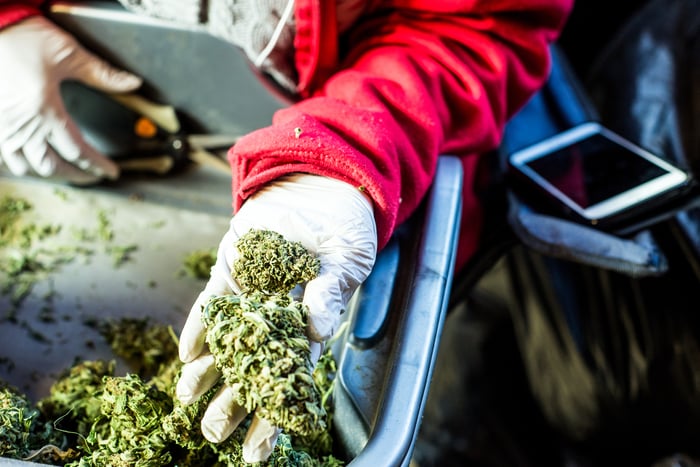Don't blink, because the marijuana industry is evolving at an incredibly fast pace. Last year alone, we witnessed more than a dozen milestones hit, with Canada becoming the first industrialized country in the world to legalize adult-use weed, the U.S. Food and Drug Administration giving the green light to a cannabis-derived drug, and even the first Canadian pot stock debuting via initial public offering on a major U.S. exchange.
It was also a year of continued favorability toward cannabis, especially in the United States. Gallup, which has conducted polls on the public's perception of marijuana for the past five decades, has found that approval for nationwide legalization has soared from 25% in 1995 to an all-time record two out of every three Americans in October 2018. This support is what's been behind the state-level push to legalize cannabis (in some capacity) at the state level.
Roughly 23 years after Proposition 215 legalized medical marijuana in California, making it the first state to pass a medical weed law, 33 states in total have given the OK to physician-prescribed pot. Meanwhile, 10 states now also allow adult-use consumption. Very soon, however, there could be 11.

Image source: Getty Images.
The Garden State is about to "go green"
As reported by Reuters this past Tuesday, March 12, after many months of debate, New Jersey Gov. Phil Murphy, a Democrat, has come to an agreement with the state's Senate and Assembly, also majority-run by Democrats, to pass recreational weed legislation. This would allow the Garden State to become only the second state, other than Vermont, to have legalized adult-use weed entirely through the legislative process (i.e., without a ballot measure that residents vote on).
Although it's unclear when the bill will be passed and brought to Gov. Murphy's desk for his signature, it'll contain a number of provisions, according to a statement from the governor's office. Firstly, it would legalize recreational marijuana and implement an excise tax on retail sales. Secondly, it would work to expunge low-level convictions for use and possession of cannabis. Finally, it would seek to offer paths of employment into the industry for minorities and women.
With Democrats overwhelmingly in favor of legalization, at least according to Gallup, and Murphy having long supported the idea of recreational weed, you might be wondering what's taken so long for the state to consider passing such a measure. The holdup has been tied to the eventual tax placed on adult-use retail sales.
Murphy had lobbied for a tax rate of as much as 25%, while members of the state's legislature have targeted a notably lower rate. According to reports, the decided-upon amount was an excise tax of $42 per ounce on cultivated cannabis, with municipalities able to tack on between a 1% and 3% tax to a wholesaler, cultivator, or retailer of cannabis.
As a reminder, black-market producers pay no excise tax, state or federal income tax, or license fees. The higher the tax, the more likely consumers are to purchase from illicit sales channels, as evidenced by California's subpar first year of recreational pot sales. It's unclear at this point whether New Jersey's relatively high tax on cultivation will dissuade consumers from buying legally produced marijuana.
Check out the latest earnings call transcript for Innovative Industrial Properties.

Image source: Getty Images.
Marijuana stocks are champing at the bit for New Jersey to legalize
If a deal has indeed been reached, New Jersey's weed industry could be generating quite a bit of green within a few years. Last May, industry advocates suggested that legalizing marijuana in the state could create an $850 million-a-year industry. Comparatively, New Frontier Data is calling for total pot sales to top $1 billion by 2023 and reach $1.2 billion by 2025. The "B" word (billion) is an easy way to get investors' attention.
One niche within the cannabis industry looking to quickly benefit if recreational marijuana becomes law in New Jersey is vertically integrated dispensaries. Since marijuana is still illegal at the federal level, thereby disallowing interstate transport, chain-based dispensaries often operate grow farms and/or processing facilities in the same states as their retail operations. This allows vertically integrated dispensaries to control their costs, supply, and the quality of the product being sold in their stores.
For example, Curaleaf Holdings (CURLF -5.94%), one of the largest multistate operators in the U.S., is developing a two-acre greenhouse in New Jersey. With most of its dispensaries located in Florida, Curaleaf is looking for a means to branch out and improve brand engagement. With New Jersey offering only a very limited number of cultivation and retail licenses, this is a means for Curaleaf to spread its wings with minimal competition.

Image source: Getty Images.
The same could be said for TerrAscend (TRSSF -3.32%). Even though TerrAscend is headquartered in Ontario, Canada, one of its subsidiaries, NETA, was awarded one of the very limited vertically integrated licenses in New Jersey. More so, NETA's retail license was awarded in New Jersey's most populous region, potentially putting TerrAscend on track to be a surprising leader in the Garden State.
Legalization may also open the door for Innovative Industrial Properties (IIPR -0.82%), a cannabis-based real estate investment trust (REIT) that acquires land and facilities for cultivation and processing, then leases these facilities for an extended period of time (often 15 to 20 years). A considerably larger recreational market would mean a big increase in demand. With the state emphasizing small business opportunity, but small businesses not always having the capital to acquire grow farms, Innovative Industrial Properties would seem like a logical bet to enter the space. And it's worth noting that Innovative Industrial Properties is also the only cannabis pure-play to pay a dividend.
New Jersey has a market opportunity that's similar to Massachusetts, so investors would be wise to keep their eyes on the state.





